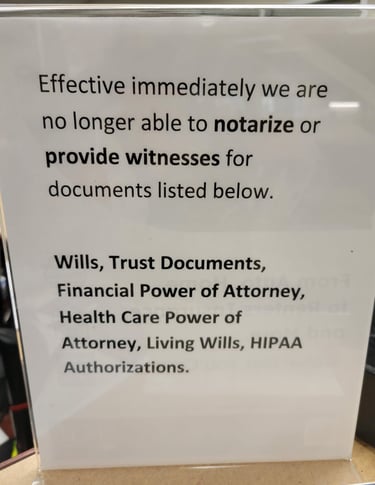don't wait. get your document notarized today! Call or text proactive mobile notary at 515-238-6201.
houston mobile notary | HOUSTON MOBILE INK CARD FINGERPRINT | HOUSTON MOBILE APOSTILLE | HOUSTON MOBILE I-9
Why Banks Are Reluctant to Notarize Power of Attorney or Wills?
POWER-OF-ATTORNEY, ESTATE PLANNING, WILLS & TRUSTS
Hanh Le
9/13/2025


Why Banks Are Reluctant to Notarize Power of Attorney and Wills
While many banks and credit unions do offer notary services, they are increasingly hesitant to notarize certain legal documents, particularly Powers of Attorney (POA) and Wills. This trend is driven by a number of factors, primarily rooted in concerns about liability and the specific nature of these documents.
Liability Concerns: Financial institutions operate under strict regulations and are highly sensitive to legal risk. Notarizing a document not directly related to their business, such as a POA or a Will, opens them up to potential legal disputes. If a document is later challenged in court due to a claim of fraud, undue influence, or a signer lacking capacity, the bank and its notary could be drawn into the lawsuit. This is a risk many institutions are no longer willing to take for a free or low-cost service.
Protecting Against Fraud and Elder Abuse: A financial POA grants another individual significant access to a person's accounts and assets. Banks are on the front lines of preventing fraud and elder abuse, and they are encouraged by state and federal agencies to actively monitor for suspicious activity. A bank may refuse to notarize a POA if they have any concerns about the principal's mental state, or if the document seems "stale" (i.e., executed many years ago and the bank worries it may not reflect the principal's current wishes).
The "Sound Mind" Dilemma: Powers of Attorney and Wills often contain language stating that the signer is "of sound and disposing mind." Notaries are not legally qualified to make a medical or mental assessment of a person's capacity. While their role is simply to verify identity and witness the signature, the inclusion of this legal language can make bank notaries uncomfortable and lead to a refusal to notarize, as they may misunderstand their limited role in the process.
Internal Policies: Many banks have simply adopted internal policies that restrict their notaries from handling documents like POAs and Wills. They may only notarize documents related to their own banking services, like a mortgage or a loan agreement, to minimize risk and streamline their operations.
The Role of a Mobile Notary
This is where a mobile notary public becomes an invaluable resource. Mobile notaries are independent professionals who travel to a client's location to perform notarizations. They fill the gap created by banks' reluctance to handle complex legal documents by providing a convenient and specialized service.
Convenience and Accessibility: Mobile notaries travel to homes, hospitals, nursing homes, or any other location that is convenient for the signer. This is particularly crucial for individuals who are elderly, ill, or have mobility issues and cannot easily get to a bank.
Expertise in Legal Documents: Unlike a bank employee who may only notarize a few documents a month, mobile notaries often specialize in a variety of complex legal documents, including estate planning paperwork. They are knowledgeable about the proper execution requirements for POAs and Wills and are better equipped to handle the unique needs of these documents.
Flexible Scheduling: Mobile notaries work by appointment, offering flexibility that a traditional bank's limited hours cannot. They can often accommodate signings on evenings or weekends, making the process much easier for busy professionals and families.
Witness Services: Many legal documents, including Wills, require witnesses in addition to a notary. Some mobile notaries can also provide witnesses as part of their service, further simplifying the process for the client.
In short, while banks have valid reasons for limiting their notary services, the demand for notarizing sensitive legal documents like Powers of Attorney and Wills has not disappeared. Mobile notaries provide a critical solution, offering a convenient, professional, and reliable alternative that ensures these important documents are properly executed.
Need a Notary? Contact ProActive Mobile Notary Today!
For reliable and flexible notary services in Houston and surrounding areas, including Brazoria County, Fort Bend County, Waller County, and Montgomery County, ProActive Mobile Notary is here to assist with your important legal documents.
Why Choose Us?
Convenience: We come to you! Our service is designed to fit your busy schedule.
Wide Service Area: Serving Houston, Katy, Cypress, Richmond, Stafford, Missouri City, Sugar Land, Rosenberg, Fresno, Pearland, Pasadena, and surrounding areas in Harris and Fort Bend Counties.
Contact Us:
Phone: (515) 238-6201
Mobile Service: Schedule a time and place that fits your needs.
Home Office (by appointment): Rolling Creek, Houston, Texas 77084
Hours: 7 days a week, from 9:00 a.m. to 9:00 p.m.
Please remember that I am not a lawyer and cannot provide legal advice.
LEGAL DISCLAIMER:
I am not an attorney licensed to practice law in Texas and may not give legal advice or accept fees for legal advice. Under the Texas Admin. Code Rule § 87.40, A Notary Public is prohibited by law to act in the capacity of an attorney, give advice in preparing legal documents, issue identification cards, distribute confidential information or perform any notarial act unless the signer is present. Any questions about your documents should be addressed to the lender, title company, or an attorney. We are not a government agency and apostille authentication is power that the government has. The role of a notary is to authenticating signatures and providing courier services to clients for their apostille documents.
© 2025. All rights reserved.
ProActive Mobile Notary brings expert, affordable mobile notary and document services directly to you across Houston, Katy, Cypress, Richmond, Sugar Land, and surrounding areas in Harris and Fort Bend Counties. Founded in 2019, we offer convenient home visits for all your notarization needs, including real estate documents, wills, trusts, affidavits, and power of attorney. Beyond general notarization, we specialize in FBI ink fingerprinting, apostille services / document authentication, and I-9 verification. We're certified, experienced, and available after-hours and weekend for flexible scheduling, with a Texas notary embosser seal on hand. Prefer to come to us? Our home office is also available by appointment for your notarization needs.
THANK YOU FOR SUPPORTING MY SMALL BUSINESS! GOD BLESS AMERICA.


Hanh Le, OWNER of Proactive mobile notary, is a licensed and bonded notary public and notary signing agent in houston, texas that has been background checked and screened annually.
We are open 7 days a week | 9:00 A.M to 9:00 P.M | Mobile and non-mobile services available | By appointment only, please call or send text to 515-238-6201
Alief, TX | Cinco Ranch, TX | Cypress, TX | Fulshear, TX | Houston, TX | Jersey Village, TX | Katy, TX | Meadows Place, TX | Memorial, TX | Mission Bend, TX | Missouri City, TX | Pearland, TX | Pecan Grove, TX | Richmond, TX | Rolling Creek, TX | Stafford, TX | Sugar Land, TX | 77084 | 77043 | 77041| 77079 | 77095 | 77040 | 77094 | 77433 | Brazoria County | Fort Bend County | Harris County | Montgomery County | Waller County | Notary Near Me | Mobile Notary Near Me | Houston Mobile Notary


